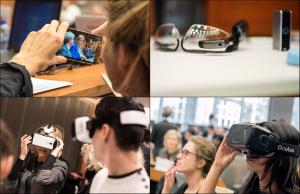Automated taxis and delivery by drone: welcome to Europe's high-tech future
New technologies such as wearable computers and face recognition promise to change the way we work, shop and entertain. Creating a digital single market could help boost Europe’s high-tech businesses and create more jobs. At a workshop organised by the EP's internal market committee on Thursday 13 November, MEPs and experts looked at ways how to achieve this. Workshop participants also tried out some new gadgets.

The event, opened by Róża Thun, a Polish member of the EPP group, started with a glimpse into the future. Using smart glasses, you can hail a driverless taxi with a simple wink of the eye. Once you are in the car, it recognises you and plays your favourite song. It drives you to a shop where you pick what you want and walk out. The money is deducted automatically using face recognition technology. Or you shop online and your purchase is delivered by a drone.
Dream or nightmare, all this will be possible already in 2020, according to Nick Sohnemann, from consultancy firm FutureCandy, who spoke about current and future ICT market trends.
Some of the devices involved are already on the market and MEPs had the chance to test out them during the workshop, though Ms Liisa Jaakonsaari, a Finnish member of the S&D group, wondered if the interests of older people were being properly considered when new technologies are being adopted by for example government services.
European companies lagging behind
Today, most of the digital innovation takes place outside Europe. Mr Sohnemann said this was because we currently have a mentality which is unfavourable to innovation.
Dr Robert D. Atkinson , of the US think tank ITIF, said that in terms of productivity growth, Europe has been lagging behind the US since 1995. The European digital single market could give European firms a scale advantage and help boost productivity growth, he said.
Impact on jobs
New technologies will also affect what jobs will be available. Sohnemann said: “We won’t need taxi drivers nor postmen anymore, automated machines will be all around us.”
Kaja Kallas, an Estonian member of the ALDE group, wondered what would happen to those taxi drivers and all those to be left unemployed. Sohnemann replied: “There will be new jobs. Facebook has created a hundred thousand jobs for social media industry in Germany.’’
Source: European Parliament
- 318 reads
Human Rights
Fostering a More Humane World: The 28th Eurasian Economic Summi

Conscience, Hope, and Action: Keys to Global Peace and Sustainability

Ringing FOWPAL’s Peace Bell for the World:Nobel Peace Prize Laureates’ Visions and Actions

Protecting the World’s Cultural Diversity for a Sustainable Future

Puppet Show I International Friendship Day 2020

